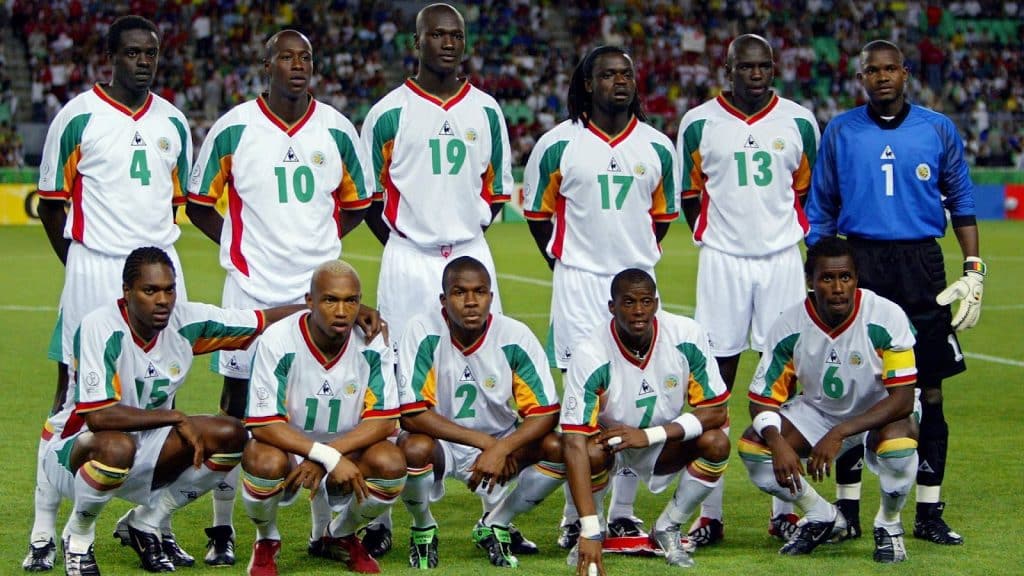In the history of football, there are teams that are etched in the collective memory, not only for their victories but also for the audacity with which they defied expectations. The remarkable performance of the Senegalese national team at the 2002 FIFA World Cup in Japan is a testament to the power of the underdog. Betting on such teams can bring a lot of money, so you can test it by choosing any from the list of bookmakers on this website. You can also find online casinos with no deposit bonus. The Lions of Teranga burst onto the world stage with unbridled enthusiasm, playing their way through the tournament and leaving an indelible mark on football folklore. This article looks at Senegal’s captivating history and highlights the key moments and personalities that shaped the historic campaign.

Historical Start
Senegal, who were taking part in the World Cup for the first time, were placed in Group A together with France, Denmark and Uruguay. In the opening match, the Lions faced the reigning world champions France and faced a formidable challenge. The aura of invincibility that surrounded the French team was shattered by Senegal’s resolute defense and incisive counter-attacks. A single goal from Bouba Diop secured the historic 1-0 victory. It was the first time an African team had beaten the reigning world champions in the opening match of a World Cup.
Via Sweden to the Quarter-finals
The decisive moment of Senegal’s campaign came in the knockout phase against Sweden. The game, which was tied 1-1 after regulation time, went into extra time, where Henri Camara etched his name in Senegalese football history. His goal secured a 2-1 victory and a place in the quarter—finals – a stage that no African country had reached since Cameroon in 1990. The Lions of Teranga had not only overcome a hurdle, but were now on the cusp of history.
Heartbreak in Extra Time
In the quarter-finals of the 2002 World Cup, Senegal and Turkey met in a historic encounter that would decide which underdog would continue its dream run. Both teams had exceeded initial expectations and had already achieved more than they had dared to hope for during the tournament.
The match developed into a hard-fought affair, with both teams playing cautiously despite the historic effort. There were a few moments of brilliance in the first half, including Halil Fadiga’s near miss and El-Hadji Diouf’s clever play that was thwarted by Turkish goalkeeper Rüştü Reçber.
There were fewer chances in the second half as both Senegal’s Diouf and Turkish goalkeeper Yıldıray Baştürk went close but were unable to capitalize. As the clock ran down, the tension mounted and the game went to extra time.
The decisive moment came early in extra time when Tugay Kerimoglu’s run was halted by a foul. The ensuing cross from Umit Davala found Ilhan Mansız, who slotted the ball into the net to give Turkey a 1-0 victory.
The golden-goal rule in force at the time spelled the end of Senegal’s remarkable journey. Despite not losing a single game in regulation time throughout the tournament, the Lions of Teranga narrowly failed to become the first African team to reach the semi-finals of the World Cup. The match against Turkey is a testament to Senegal’s valiant performance and leaves a bittersweet impression of the unforgettable 2002 campaign.
Unity in Colored Roars
Individual brilliance and collective teamwork characterized the Senegalese team in 2002. The leadership qualities of captain Aliou Cissé, the solid defensive work of Bouba Diop and the attacking qualities of El Hadji Diouf, who was voted by Goal in the list of the 10 best African players in Liverpool’s history, formed a strong team. The mixture of experienced players and up-and-coming talent highlighted Senegal’s footballing ability and disproved the impression that they were underdogs.
Off the pitch, the brightly colored and infectious energy of the Senegalese fans caught the attention of the world. The unity between the team and its fans became a beacon of hope and celebration that transcended borders and embodied the true spirit of the World Cup. Senegal’s journey in 2002 marked a turning point for African football, challenging stereotypes and paving the way for future success.
Conclusion
As the final whistle echoed in Japan, Senegal might not have lifted the coveted trophy, but they had won something far greater—the admiration and respect of football fans worldwide. Their journey transcended the boundaries of sport, becoming a tale of triumph against the odds. The Lions of Teranga had roared, and their legacy endures as a beacon of hope for aspiring footballers and a testament to the enduring magic of the beautiful game.


